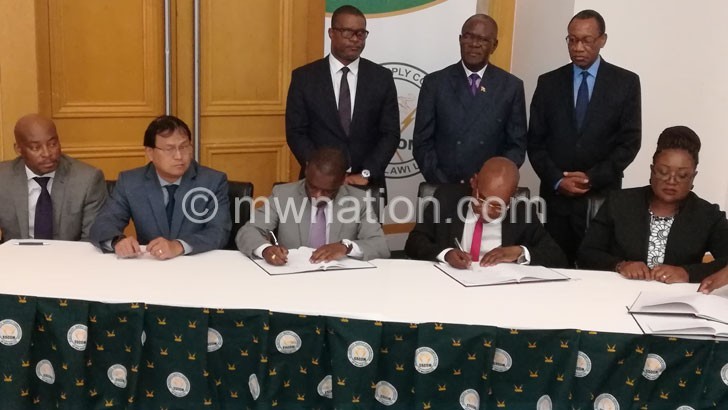
Malawi will have the opportunity to buy 200 megawatts (MW) of power from the Southern Africa Power Pool (Sapp) once the $127 million (about K94 billion) power interconnection project with Mozambique materialises by 2022.
Minister of Natural Resources, Energy and Mining Aggrey Masi said this yesterday in Lilongwe after signing five project agreements between Electricity Supply Corporation of Malawi and Electricidade De Mocambique (E. P. EDM) with his counterpart from Mozambique, Ernesto Tonela.

The project agreements that include implementation, system operating, maintenance, wheeling and power purchase, are subject to renewal every five years as Malawi is still developing its internal power generation capacity.
In his speech, Masi was cautious saying: “The signing of the agreements does not mean that we will start getting the power immediately from Mozambique. It will take time because we need to construct transmission lines first and that project will take us till 2022.”
“Upon completion of the project, we will get 50MW from Mozambique and another 150MW from South Africa totalling 200MW. We are already discussing with the South African Government within the Sapp framework.”
Mozambique Minister of Mineral Resources and Energy Ernesto Tonela said his country is happy to have finally seen the project coming to fruition after a long period of negotiations.
““The project will ensure Mozambique exports power to Malawi and in future Malawi will also be able to export power to the region after having the surplus,” he said.
The transmission lines for the project, whose negotiations started in 2007 after the World Bank approved a $93 million line of credit, but later cancelled it in 2010 citing Malawi Parliament’s failure to approve the Loan Authorisation Bill, will cover a distance of 210 kilometres (km) from Matambo in Tete Province to Phombeya in Balaka.
The line is expected to be a double circuit with a carrying capacity of 2 400 kilovolts when all phases are completed.
Escom chief executive officer Allexon Chiwaya, on his part, said the cost of the project as determined by the feasibility study for the double circuit line is $127 million (about K94 billion).
He said out of the amount, $92 million (about K68 billion) will be spent on the Mozambique side with the remaining $35 million (about K26 billion) on the Malawi side.
Said Chiwaya: “The power demand-supply balance for Malawi shows that due to delays in the implementation of the major power supply projects in the country in the medium to long-term to ensure energy security, Malawi will need to import about 200MW of power from Sapp for two to three years after the interconnection is commissioned in 2022 to cover the power supply deficit.”
He said the project entails that the wheeling agreement unlike most standard agreements, Escom will be paying EDM for the full cost of investment for the Mozambique portion of the line.
Through the arrangement, any party that wants to wheel power through the line, including EDM, will pay compensation to offset the full cost that Escom will have been paying for the line.
Germany Ambassador Jurgen Borsh, whose government through KfW, a development bank, provided part of the funding of the project, described the agreements as a milestone for sustainably overcoming energy shortages in Malawi.
The other financiers, who have pulled 20 million euros (about K17 billion) are the World Bank and Norwegian Trust Fund.
Source: The Nation_Friday, 12 April 2019_by Steve Chilundu
